#Exeunt was epic
Explore tagged Tumblr posts
Text
At the risk of overposting…back from the framer and on my wall in perpetuity. Thanks, endeavourneverland!

#itv endeavour#endeavour morse#shaun evans#endeavour itv#bts endeavour#endeavourneverland#this is why i spent money on an endeavourneverland print#endeavour: exeunt#Final Morse and Thursday scene#Radcliffe Camera#emotional overload#mine#b&w#b&w photography#black and white photography#roger allam#fred thursday#our beautiful boy#Exeunt was epic#epic acting#la douleur exquise#art photography#morse and thursday
26 notes
·
View notes
Text
This much pain and agony should require a warning label. Just get the Cuisinart and throw my heart in it.
That they should end up here, from there… it’s soul-destroying. 
Martin Scorsese once described “The Age of Innocence“ as his “most violent film“. This was right after it came out, and he’s directed some pretty bloody shit since then, so perhaps it doesn’t entirely hold true any longer, but I thought of that as I watched this scene.
It could not be more cold and brutal if it had been dripping in ice and blood. 
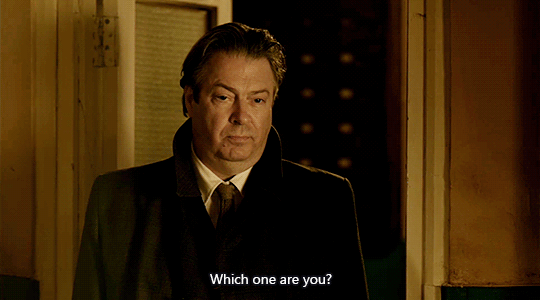
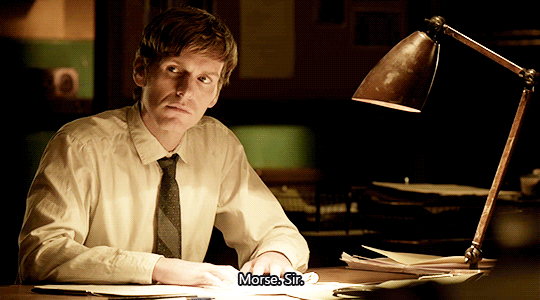

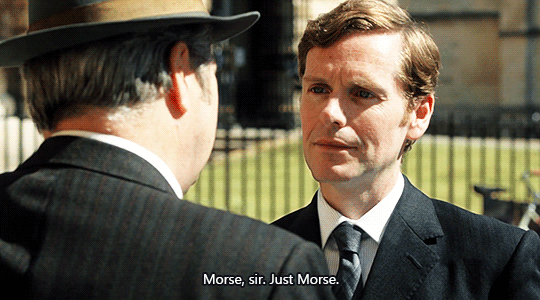
beginnings and endings
#itv endeavour#endeavour spoilers#endeavour morse#fred thursday#roger allam#shaun evans#heartbreaking#epic acting#emotional overload#i’ll never get over it#S9 Exeunt#Exeunt#just Morse#I’m crying#Sever all ties#One of the most brutal scenes I’ve ever seen#cold-blooded#the brutality under the politeness
538 notes
·
View notes
Text
url song game
i was tagged by @gracefulchristiangirl for this!
so the rules of the game are to write one song for every letter in your url T- Thunder Bringer from Epic: The musical H- Hold Me Now by Red O- Open Arms From Epic: The Musical M- Mercy Tree by Lacey Sturm A- A Troubled Mind by Noah Kahan S- Soldier, Poet, King by The Oh Hellos S-Shrike by Hozier T- Trees by Twenty One Pilots A- Any Kind Of Dead Person by Ghost Quartet P- Poisoning Pigeons in the Park by Tom Lehrer L- Let Me Drown by We As Human E- Exeunt by The Oh Hellos S- Sisyphus by Andrew Bird
2 notes
·
View notes
Text
ou, i got tagged by @rune-chaser (here)
first ten songs that come up on shuffle in my on-repeat playlist
Therapy by Andrew Garfield and Vanessa Hudgens
Who is She? (Reprise) by Kimiko Glenn
Just a Man by Jorge Rivera-Herrans & the Epic cast
Stay Frosty Royal Milk Tea by Fall Out Boy
Santa Fe by Autoheart
Heartbreak Feels So Good by Fall Out Boy
Exeunt by The Oh Hellos
Who is She? by Kimiko Glenn, Megan Nicole Dong, & Megan Hitly (which is currently #1 lmfao)
Novocaine by Fall Out Boy
Bitter Water by The Oh Hellos
#i got tagged#somehow Burn for You isnt on the list at all and that means simply it hasnt been updated yet lmao#this tag chain ends with me (unless fwiembs wanna haveatit)#Just a Man still being on the list AND at 2 is insane to me. i havent listened to it in a hot minute UH OH MY WRAPPED IS IN DANGER LMAO#my life
2 notes
·
View notes
Text
i'm agnostic but i'm reading the bible for fun and i can't get over the way god in genesis behaves
god: alright, look, i know i just destroyed the entire world in a melodramatic fit of divine wrath because i saw a bunch of people fucking their siblings, but look. whenever i start to get really fucking mad at you guys and want to drown you all again i'll just look at these pretty colors in the sky and remember my anger management classes!
noah, pale and shaking, having just watched the entire fucking world drown, hasn't seen solid land for forty days and is moments from collapsing into a hysterical panic attack: okay cool. cool. that's awesome thanks so much
#KSNDNFHSKSND#don't get me wrong i'm not reading this from an xtian perspective in the slightest#i really regard it more as an epic fiction novel#but still. it's so funny#exeunt: bay#religion
164 notes
·
View notes
Text

What a great game. I was slammed all day and I’m just catching up now. It’s technically Thursday, but humor me. I tried not to go back to the same well, but this just screams. “what “ to me. No, I’m not choked up. No. I’m not. Honestly. 
ANNOUNCEMENT: Due to reduced content for HNW as a result of significant non-compliance with multiple contractual elements, an alternate theme for today has been implemented as a temporary measure. Regular HNW programming will resume once our crack legal team has finished *ahem* dealing with Mr. Evans.
NEW THEME: ONE WORD WEDNESDAY
Pick a photo or a gif that reflects the word of the day and reblog with tags in this thread (coz we want to see all the choices 😉)
Today’s word: WHAT

#endeavour morse#endeavourtv#one word wednesday#shaun evans#he’s about to produce the button.#what about Tomahawk?#WHAT NEW HNW CONTENT WHEN WE HAVE THE WHAT GAME?#endeavour itv#emotional overload#epic acting#itv endeavour#what the fuck#incredulous#the captain i would have followed into hell#endeavour: exeunt#HNW-less Wednesday#when in doubt Exeunt is the answer#i’m not crying you’re crying
34 notes
·
View notes
Text
#unhallowedarts The Tale Of Lohengrin, Wagner and the Golden Age of Illustration

“Aye , quick it is with the seeds of
change
With blessing and with bane.
But I deem it a thousand years shall run
Or ever beneath the open sun Thy voice shall sound again”
(T.W. Rolleston)
It was a knight in shining armour all right, albeit not white-steeded but pulled up the river Scheldt by a white swan, to save Elsa, ubiquitous damsel in distress, from dark Count Telramund’s cabal to usurp the Duchy of Brabant. In trial by combat, goes without saying, as it was the custom back in the days of King Henry the Fowler, which were at the turn of the 10th century when the place was part of the East-Frankish kingdom of Austrasia. Or so Richard Wagner would have it in his usually somewhat giddy take on Medieval epics and historical events. The valiant’s name, however, was Lohengrin, the one from Lothringen, Lorraine, obfuscating the man’s true origins: Lohengrin hailed from the grail castle Monsalvat, Wagner’s scene for “Parsifal” thirty years after “Lohengrin” premiered in Weimar in 1850.

Lohengrin’s mystical provenance is one of the arch-Romantic opera’s central motifs and, of course, the Germans have a word for it, “Frageverbot”, the forbidden question after the man’s origins, checking at least two of the “tall, dark, stranger” three boxes. Lohengrin is a luminous figure, but a rather sad one and the story ends in tears when the hero sails, swan-propelled, into the sunset after his work is done. Bitter, but Wagner and the zeitgeist wouldn’t have it any other way.
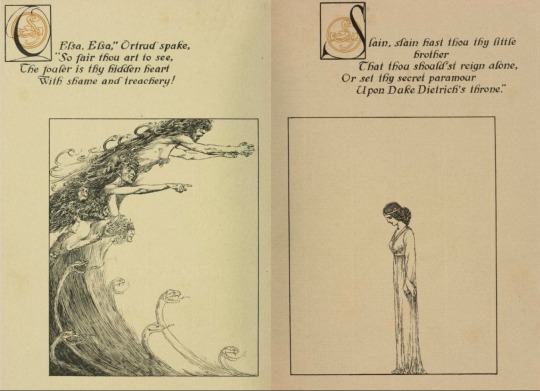
The tale of Lohengrin itself hails back to the High Middle Ages, honourably mentioned by Wolfram von Eschenbach in the early 13th century as Garin le Loherain in the minnesinger's “Parsifal”, gets two own contemporary verse epics and several variants of the swan knight theme over the next centuries until Wagner collected them all and crammed the rich material into his three hour opera, along with heroics from antiquity, elements that were perceived as Germanic paganism in the rather clouded view of the 19th century on Iron Age customs and beliefs and politics of Wagner’s own day when the Germans fought for their national unity. Along with romanticised Christian mysticism. Lohengrin is a grail knight, after all. And they do get properly married, Elsa and Lohengrin, to the sounds of “Here Comes the Bride”, no less, faithfully guided, “Treulich geführt” in Wagner’s original German from the opera’s libretto, a tune heard at the fabled joyous event across the globe ever since a Prussian royal wedding in 1858.

Wirkmächtig, efficacious, and if only for said tune, even if the topic borrowed from the old tale of Zeus and Semele, the metaphysic being hiding its true identity because the partner-to-be, as the saying goes, “can’t handle the truth” should raise every imaginable red flag, Romantic mystery or not. Even if Lohengrin reveals his true identity in the end, before his picturesque exeunt when the king calls to arms to make war against the pagan marauding Hungarians down South.
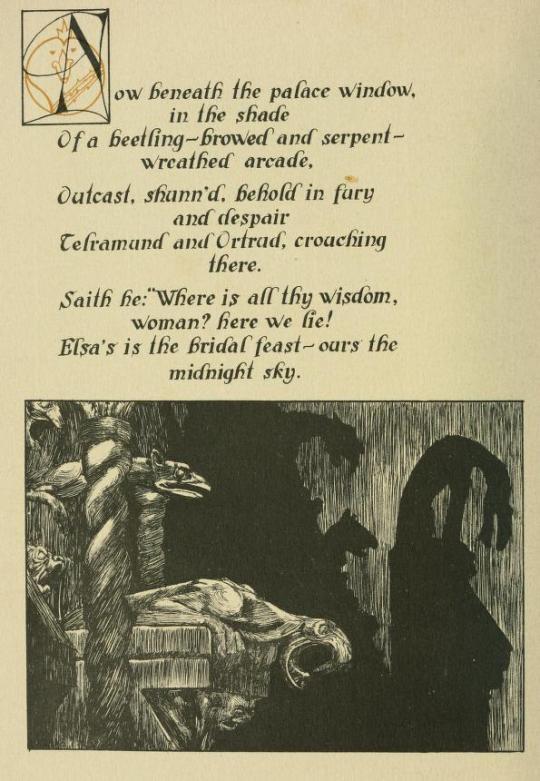
On that note, it is not without irony that Willy Pogany, born in 1882 in the back-then Austro-Hungarian city of Szeged, illustrated the tale of Wagner’s “Lohengrin” for Rolleston’s retelling with rich imagery that equals that of the better known Arthur Rackham’s of the “Ring” trilogy published around the same time. Pogany’s “Lohengrin” hit the booksellers’ shelves in 1911, along with “Parsifal” and “Tannhäuser”, when precious “gift books”, illuminated by the luminaries of the Golden Age of Illustration, were still all the rage as Christmas presents in a time when “education” was a hallmark of what passed as “better classes” back in the day.
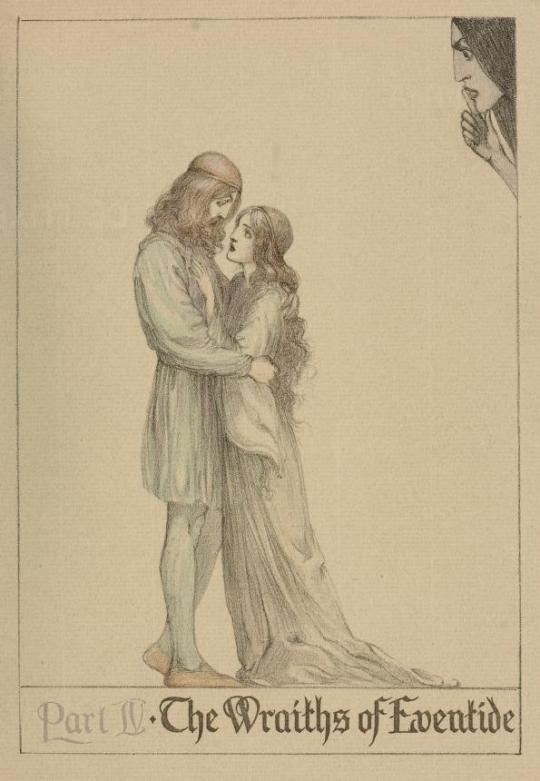
Pogany, pronounced PO-gahn, immigrated to the US before the Great War turned the world upside down in Europe, after getting properly married in London, revealing his true identity from the very beginning, goes without saying. He continued to illustrate mainly children’s books and stuck to his Art Nouveau-influenced style that sometimes reminds of Edmund Dulac, albeit with stronger lines and expressions than the Anglo-French better-known master would come up with in his dreamy takes on often the same themes as Pogany took on.
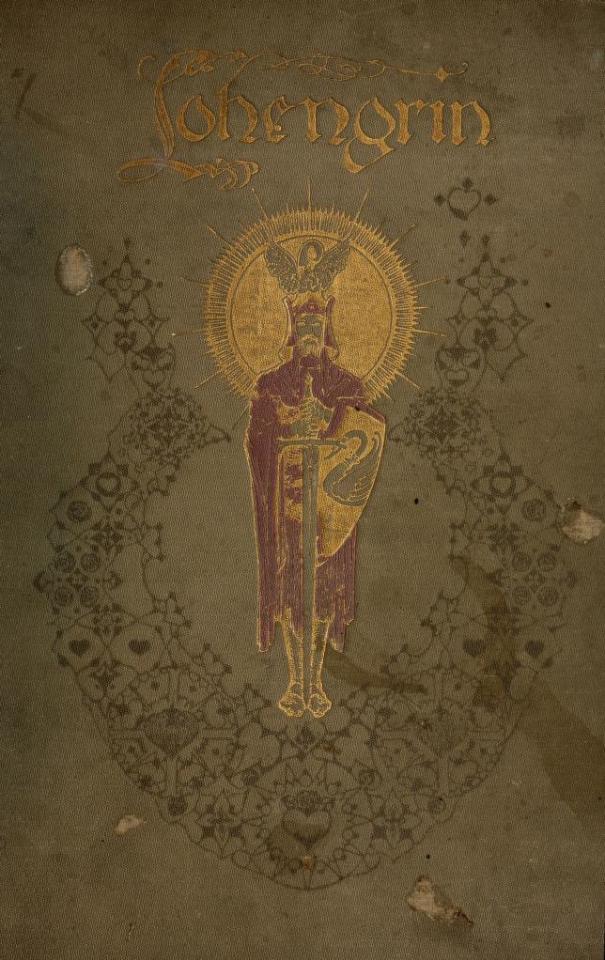
T.W. Rolleston retelling of Wagner's "Lohengrin" along with all of Willy Pogany's enchanting (and often quite dark) illustrations can be cherished following the link to a facsimile below:
#unhallowedarts#dark art#dark aesthetic#dark academia#bookart#dark acadamia aesthetic#golden age of illustration#art nouveau
37 notes
·
View notes
Text
URL MIXTAPE GAME
RULES: PICK A SONG FOR EACH LETTER OF YOUR URL THEN TAG THE SAME NUMBER OF BLOGS
Thanks for tagging me @themusesthrall!!
A: Agoraphobia - Autoheart
L: Losing My Mind - Angels & Airwaves
O: On Giant's Shoulders - Future Of Forestry
T: Temple - Parson James
U: Understanding! or Understanding the Mysteries of the Universe Via Spiritual and Sexual Awakening! - Sunbears!
S: Secret Worlds - The Amazing Devil
L: Lost in Time and Space - Lord Huron
E: Exeunt - The Oh Hellos
A: Atom - The Sonder Bombs
F: False Confidence - Noah Kahan
Honorable Mentions: Epic III - NYTW Hadestown, Exits - Foals, Terraforming (4-Track Demo) - Deal Casino
@rush-valley @flugelwhisper @what-if-angels @scientists-and-stars @coffeecakecafe @geno-haradan @count-thotticus @zomonro @weaselle @elitheradguy and whoever else wants to do it!
3 notes
·
View notes
Text
It’s Waterworks Wednesday!
It’s also HNW and OWW—there are myriad Wednesday things to play with now.
This only came about because I was watching the show and crying as usual and began to consider how many episodes make me cry.
So many make me cry that I actually had a hard time figuring out which one to select once I decided to go down this road. I went with the easiest one because whereas some make me teary, and some sometimes get me teary and sometimes leave me only misty-eyed, this one has me in an actual puddle of salt water 100% of the time. 
What’s the one that gets you crying every time? 


#endeavour morse#itv endeavour#endeavour itv#shaun evans#emotional overload#roger allam#epic acting#endeavouredit#fred thursday#why can’t I stop?#i cry every time#I cry you cry we all cry#it breaks my heart#shattered#this show is an onion#Endeavour: Exeunt#waterworks Wednesday#not a cult#this show breaks my heart#damn you russell lewis
61 notes
·
View notes
Text
Whyyyyyyyyyy you gotta make me cry? Whyyyyyyyyyy?
That smile through the pain—his face is a grimace of agony. The only scarier one is when he calls her Mrs. Strange at the wedding. Oh my God. This show. Ow ow ow ow.





Morse: You alright? Joan: Yeah. Reverend: Is this the lucky man? Joan: Uh, no, this is Mr. Morse. Morse: I'm the Best Man. Reverend: Ah! Well don't worry. If the Groom doesn't turn up we shan't be calling you to step into the breach.
Endeavour | Exeunt
#itv endeavour#endeavour: exeunt#morse x joan#shaun evans#sara vickers#ow#my heart hurts#breaks my heart#you don’t ever need to look up rictus in the dictionary. This is what a rictus is.#Joan is marrying Strange and it’s grotesque#my poor boy#my poor heartbroken Morse#i’ll never forgive her#i’ll never recover#damn you russell lewis#He’s in hell#Why is she doing this? He’s just a workaholic.#Why does she nod and smile here? I find it very confusing.#i’ll never get over it#endeavour itv#endeavour morse#epic acting#emotional overload#i’m not crying you’re crying#la douleur exquise
133 notes
·
View notes
Text
OC Questionnaire
Tagged by: myself!! clearing out my drafts, found this, decided to post it
Tagging: @sunsetofdoom @jokomalegacy @exeunt-legacy @chubbyooo anyone who wants to do this really

GENERAL
Name: Mordesri Sool
Alias(es): Nirdōṣa Dhaar, Ordes’natto, Cipher Nine, Red Blade, Legate
Gender: Male
Age: 27 as of start of KoTFE
Place of birth: small Hutt-controlled planet in the outer rim
Spoken languages: Huttese, Zatton, Basic, Rodese, Bocce, and a couple more
Sexual orientation: Gay
Occupation: secret agent, alliance commander
APPEARANCE
Eye color: Green
Hair color: N/A
Height: 5′4
Scars: three lash marks on his back, blaster burn on his left side, two stab wounds: one near his hearts, the other on his right thigh; has various others but those are the most noticeable ones
FAVORITE
Color: dark purple, midnight blue
Hair color: brown
Eye color: brown
Entertainment: Live theatre, live music
Pastime: reading, wild camping, barbecue parties as of KotFE
Food: spicy, meaty dishes!!
Drink: probably something like mexican hot chocolate but with jikirri spices in it
Books: poetry collections, epics and mythologies, ancient history
HAVE THEY
Passed university: No
Had sex: Yes
Had sex in public: No
Gotten pregnant: No
Kissed a man: Yes
Kissed a woman: Yes
Gotten tattoos: No
Gotten piercings: ...yes
Had a broken heart: Yes
Been in love: Yes
Stayed up for more than 24 hours: Often
ARE THEY
A virgin: No
A cuddler: Yes
A kisser: Yes
A smoker: No
Scared easily: No
Jealous easily: No
Trustworthy: Yes
Dominant: Tends toward treating others as equals until they give him reason not to.
Submissive: Socially, never. Sexually, rarely, and only with someone he completely trusts.
Single: As of KotFE and beyond, no: in a relationship w Theron Shan
RANDOM QUESTIONS
Wanted to kill someone: Yes
Actually killed someone: Yes
Ridden a beast: Yes
Have/had a job: Yes
Have any fears: Being mind-controlled, losing his freedom, losing his friends/family (again)
FAMILY
Sibling(s): no
Parents: Yarazeth, mother, deceased. Father, unknown. Bezieama, aunt, alive.
Children: None
Pets: i have been playing with the thought that he would get an akk dog after he leaves the Alliance
#oc: mordesri sool#????#nowadays i've been picturing him with a little white cat as a pet so there is that#dont know why i never posted this.........#if you are wondering what jikirri would taste like the answer is purple#can i elaborate on that? no i cannot#all i know is the spice itself is purple; its edible; used as a fragrance and as an incense#its really popular on zatto#and mordesri loves it#a lot#horribly enough that is the best screenshot i could find of him :/#i need to play his story some more#i have a new alt of him so i'll probably be getting better photos soon
2 notes
·
View notes
Text
Wesley Watches And Rates All The Faust Operas
You thought I was kidding, but here we are:
*I am not an expert, and my advice should never be followed. I am but a humble nerd with a passion, dragging you along on my youtube-tour. You probably shouldn’t quote me, but using this as a starting point and guide to this particular musical and literary phenomenon is encouraged! The information below was gleaned largely from wikipedia, vague memories of my BA degree, and my own assessment of the source materials.
My ratings are based on my subjective enjoyment, and a few preferential criterion such as: 1) Was Mephistopheles fuckable, 2) Did I get to see an orgy of witches, 3)Does Marguerite pass the Sexy Lampshade Test, and 4) Was Faust Dragged to Hell.
Preliminary Notes: originally, the legend of Doctor Faust came from the sixteenth century and was inspired by one man (or possibly two who were later conflated), Johann SpidersGeorg Faust, who was your average practitioner of Renaissance Magic. He was not an especially savory individual; he had racked up quite a criminal record and been boastful enough of his “christlike” abilities to heal the sick and perform miracles that he’d seriously annoyed the church. He was denied entry into a city due to accusations of Necromancy and Sodomy. Being an alchemist, Faust got up to some particularly adventurous chemistry experiments, the last of which failed so spectacularly that his lab exploded and the doctor was reduced to his component parts. His remains after death were so gruesome that his colleagues came to the obvious conclusion: He’d been personally dragged to Hell by Satan himself. AND THUS WAS A LEGEND BORN.
The story of Faust was told and disseminated in sixteenth century chapbooks (early printing-press zines, if you will) as a dramatic morality tale. It is from the chapbooks we originally get the character of Mephistopheles, the pact exchanging 24 years of service for the soul, the famulus named Wagner, the wild adventures through various courts, and the conjuration of Helen of Troy. Aside from in the chapbooks, there is one version of Chrisopher Marlowe’s play Doctor Faustus, where the titular character is torn asunder by demons as he is dragged to hell-- but unfortunately for me, a known B-movie horror enthusiast-- this ending appears in no subsequent retellings of the Faust legend. Cowards.
Goethe’s play Faust is obviously the most famous adaptation of the legend, and through it the legend turns from a cautionary tale to a story of hubris, love, faith, and philosophy. If you’re not already familiar with Faust, you might take a moment to read it or at least check out the act summaries. You’ll understand everything that references it a lot better if you do, even if you just read Part I (the second part gets a bit tedious unless you have a fetish for Herodotus and metaphysics-- but there’s a cute homunculus in a bottle! and talking sphinxes and griffons! and kinky rose petals! Angel butts!!!).
Armed with this knowledge, let the opera tour begin:
Faust (1816, Louis Spohr)
--The Libretto with English translation
--Playlist of the whole opera
It’s very pretty! The style and over-all sound reminds me of a Mozart opera, which, I guess, is not too surprising considering they were more or less contemporaries who trained and worked in similar circles. (Louis Spohr! He did collaborations with Beethoven! He invented the violin chinrest! Who knew! Not me! Anyway--) This Faust is not based on either Marlowe or Goethe’s Faust, but rather some miscellaneous adventures from the early Faust legends and chapbook pamphlets. In this version Faust ensnares a devil named Mephistopheles to his service, vowing to use his powers for the good of mankind. Great plan! That always goes well!
There’s a love potion, a flying cape, a duel with an outraged rival-- all the usual necessities for a Faust story, only now there’s not one but TWO young women screwed over by Faust’s philandering! (His first love, Röschen, and erstwhile damsel-in-distress, Kunilingus. ....*checks notes*, sorry, no, “Kunigunde”). Mephistopheles is cattily insightful, the wronged women team up to avenge themselves against their seducer, and yes, yes indeed, Faust Is Dragged To Hell!
The poetry of the libretto is quite pleasing, it’s got some great dialogue and epic fantasy sequences. Mephistopheles puts on show of infernal pyrotechnics with 17th century stage effects, all of them tremendous fire hazards. Someone gets dragged to Hell by a chorus of dancing goblins before Act 1 even finishes-- O my cup runneth over! We get the witches’ sabbath atop Mt Blocksberg, there’s a guest appearance by Sycorax, everyone gets real horny up there with a love potion, it’s great.
Mephistopheles seems to be on the ladies’ side in the story (as much as he’s on any human’s side), in that he cautions them not to trust Faust, and urges them on when they FREAKING TEAM UP AND GO TO SEEK VENGEANCE. Oh my god it’s so great. Kunigunde attacks Faust and Faust freaks out and tells Mephistopheles to save him and Meph is all “what’s that? I don’t know, suddenly I can’t read”. Meph is also the one doing all the actual rescuing of distressed maidens, at Faust’s behest. He views Faust’s attempts to break the laws of Love and Nature with contempt, knowing that Faust’s soul is on the fast track to Hell. There’s no actual pact here; Meph is the one being held hostage. He makes sure that Faust doesn’t enjoy any of the spoils of his sorcery, so Faust’s ennui and dissatisfaction remain the same as before he began his quest to “Use Hell’s Powers For Good”.
And just quick review of the scoreboard: Faust used his powers to do 1 (one) useful thing with his power before he ruined a bunch of people’s lives in quick succession, murdering Kunigunde’s betrothed and driving Rose to suicide. He still cries about it and the “rich seeds of Good he sowed” but Meph is having none of it and HE. DRAGS. THAT. BOY. TO. HELL!!!!!!! EXEUNT.
Rating: 4/5 Stars. Better than expected! I want a revival of this version! With stabbing! And special effects! Mephistopheles is truly doing the Lord’s work here, no offense to his demonship. Lost some points with me for being so very, very heavy on the pining and lovesick maidens, but won me back when the lovesick maidens picked up daggers.
Faust and Marguerite (1855, Lutz) and Faust up to Date (1888, Lutz)
Straight up can’t find this one! But this early silent film short is apparently based on it? IDK folks, if you have a recording of this you’d like to share with me, I’d be delighted to hear it.
As for the burlesque, I suspect it hasn’t actually been performed since 1888. But the music is pretty cute! The Pas de Quatre, aka “Skirt Dance” seems to be the only track that’s stuck around. Here it is played on an old disc music box.
Rating: ???
La damnation de Faust (1846, Berlioz)
--Libretto in French and English
--La Damnation de Faust with Jonas Kaufmann --I like this one because Faust is super duper cute and this Mephistopheles reminds me of an OC makes yellow work.
--This is the first of what I’m called The Big Three Faust Plays; all modeled after Goethe’s Faust specifically, written within roughly ten years of each other, and which feature the most well-known arias that I’m aware of.
This opera positively reeks of Romanticism; it’s got Byron out the ears, it’s wading through Wordsworth, it’s doing the Grand Tour, it’s gazing mournfully from the top of Mont Blanc, contemplating Nature and the Human Spirit. It’s Berlioz, buckle up.
The beginning is obviously Faust wallowing in ennui. He considers suicide, but is interrupted by a timely reminder of Christianity. Suddenly the devil appears in order to take advantage of a soul precariously teetering on the edge between redemption and damnation. In this version, the devil does not announce himself as the devil, but rather as the ~Spirit of Life~, here to show Faust the joys of the world. (There’s no pact at first, Meph is just “get in bitch we’re going debauching” and Faust’s like “aight” and they’re off.) The devil takes Faust on a fun tour of life’s noteworthy attractions such as “Drunk Student Karaoke”, “Dancing Gnomes”, and “A Nice Forest Nap”.
During his magical nap Faust sees a vision of Marguerite (later we learn she has simultaneously dreamed of Faust) and falls in love. He awakes with the usual boner for this Maiden of Radiant and Humble Virtue who Nature Hath Sheltered In Perfect Simplicity, because that’s always a big turn-on. Meph steers the course of their interactions very carefully, using magic and fairies and wisps to enchant the couple’s surroundings to ensure they are surrounded by romantic atmosphere the whole time. Once they’ve gotten into some heavy necking, he bursts in and tells them that the whole town is coming with pitchforks and also someone’s told the girl’s mother and they’re in big trouble. Faust flees.
Everyone does some quality Pining, Faust sings a sad song about Nature, and then Meph shows up again saying “hey I hope this doesn’t put a damper on our vacation, but Marguerite is in prison for murder and she’s going to be executed BUT QUICK, ACT NOW AND WE CAN SAVE HER for just one quick easy payment of your immortal soul” and Faust is just like “WHAT WHERE WHO WHAT UH FINE YES SURE OKAY SHIT, WOW, LET’S GO” and Meph is >:))) and they jump on their horses and ride off to go save her except OOPS, NO THEY DON’T because actually they are RIDING INTO THE WAITING JAWS OF HELL!!!! NYAK NYAK NYAK NYEEEEEHHHHH!!! Faust burns for eternity, Marguerite goes to heaven, curtain.
Rating: 3.5/5 Look, I’m not saying I’m biased, but Mephistopheles doesn’t even show up until half an hour into the opera, okay? I find this one hard to sit through even though the music is really delightful; and I do mean it is gorgeous music. Between the two famous mocking serenades, “Devant la maison” shoots “Vous quid faites l’endormie” right out of the water; all the chorus pieces are fantastic; the Hungarian March is a great instrumental piece; Faust actually has some decent arias for once (rarer in each subsequent opera), and there is Brander’s wonderfully irreverent Rat Song... I think the reason this doesn’t hold my attention as much as other versions is that the plot is very meandering and the characters don’t have concrete motivations; they’re sad teenagers in love, I guess? And the devil tricks them? This whimsical aspect is 1000% part and parcel of the Romantic Aesthetic I realize, but personally I came for a recognizable story and got mostly pastoral vignettes. We spend half the opera listening to Frolicking Peasants and Men At Arms. Mephistopheles just hops out of the woodwork to play a dirty trick on a random guy getting his Byronic Mope on. There’s no pact, no soul-signing until the very end, and it’s just a plain ol’ tricky trap, not a device to punish hubris or moral crimes. I’m even reluctant to give this its rightful Dragged To Hell points because out of all the Faust scenarios, this is the one where he seems to deserve it the least! He doesn’t actually do anything bad! It’s not satisfying if he’s dragged to Hell for no reason! Pfui. However, points gained back for the made-up Satanic babble sung by infernal chorus at the end.
Faust (1859, Gounod)
--Libretto in French and English
--1995 Adaptation with Samuel Ramey as Mephistopheles You already know I’m a slut for Samuel Ramey playing the devil in any capacity so I’ll spare you my gushing play-by-play of his performance. The quality of this video is.... not great. I apologize. I still love it, but you’re going to want to find a clearer recording of the music if you want to get the most out of this opera.
--2011 Adaptation with Paul Gay as Mephistopheles (Warning: this version is quite lurid and includes some staging choices that I find pretty uncomfortable-- I can’t decide if the director is consciously trying to highlight predatory sexism as a bad thing or if it’s just kind of included to make things seem ~spicy~. Anyway, it’s otherwise a high quality production with an interesting set design, just be warned that there’s some on-stage grossness. Also, a hilariously bad decapitated head prop! --to accompany a truly baffling ending. To its credit, the death of Valentin was genuinely pretty moving and made me feel... er, well, anything about the character. Tassis Christoyannis’s made that aria memorable, which is more than I can say of other productions.
Second of the Big Three!
Gounod introduces a more complete cast of characters borrowed from Goethe’s Faust to flesh out the the story and setting; we meet Wagner the student, a regiment of soldiers including Marguerite’s brother, Valentin, and their young friend Siebel (a pants role-- which immediately endears me to this character because I’m a ~big ol’ queer~). Later we meet Marguerite’s nosy old neighbor, Martha, who is REAL thirsty for Mephistopheles and who I relate to very much.
This opera follows Goethe’s Faust- Part I much more closely than its predecessor, and where it does not follow the original, it diverges in favor of making the story more engaging and streamlined. There is WAY LESS pining into the aether, and more sword fights. The larger cast of named characters makes for more interactions, which in turn makes for more memorable moments on stage, better dialogue, a comprehensible timeline of events, and more concrete motivations for everyone.
A SUMMARY: Faust’s pact in this version has nothing to do with the philosophical wager seen in Goethe, but is simply an exchange of his soul for returned youth. He is old, he’s spent his life studying, he wants to be young and full of passion again. He seals the deal after the devil offers him a vision of Marguerite, whose sight is so inspiring and lovely that Faust is overcome with desire for her alone. They go to find her, encountering on the way a regiment of students and soldiers, one of whom is Marguerite’s brother, Valentin, who is going off to war leaving his sister in the care of young Siebel. Getting Marguerite to stop and talk to Faust proves difficult since she is so pure and virtuous that A) Mephistopheles has no power over her, and B) she’s wary of the compliments of strangers. Faust gets Mephistopheles to bring her a case of jewels to warm her up to him, then Mephistopheles concocts a ruse to distract her nosy neighbor Martha and give them an excuse to meet Marguerite (shenanigans ensue). The ploy works, Marguerite is seduced, and in love with Faust. Cut to some time in the future, when Oh No Everything Has Gone Horribly Wrong; Faust has gone away and left Marguerite pregnant and unmarried, she is shunned by society with the exception of Siebel, meanwhile her brother has come home from the war to find her in a disgrace. Faust and Mephistopheles eventually return, but encounter an enraged Valentin who duels Faust to avenge his sister’s honor. Faust, of course, uses Mephistopheles’s magic to cheat, and Valentin is fatally stabbed. With his dying breaths, he curses his sister and blames her for his death, since he died defending her honor-- the people who witness this are rightfully aghast that he’d use his last moments to denounce his own sister-- and rightly so, because that’s a real dick move. Faust flees, and Marguerite is left on her own with no support and a newborn child to care for. She seeks refuge and forgiveness in the church, but finds she cannot pray, haunted by voices and cursed by Mephistopheles himself, as he whispers in her ear, promising damnation. She faints, and is presumably driven mad. Cut to Faust, who is being treated to a front-row seat of Walpurgisnacht. During the revels he sees another vision of Marguerite, this time of her in chains and awaiting execution for the murder of her child. Mephistopheles grudgingly takes Faust to see her in prison, where he tries to rescue her. In her fevered state she will not leave, wanting Faust to instead stay with her in the cell. During the delay, she sees Mephistopheles and finally puts two and two together, knowing a devil when she sees one, and understanding that Faust is not only responsible for her suffering but also in league with infernal powers. She pushes him aside, rejects him, and throws herself instead on the mercy of God, choosing death and redemption over being rescued by the man whose affections ruined her. Mephistopheles ruefully pronounces her condemned, but a voice from Heaven pronounces her Saved. Faust watches in awe as Marguerite’s soul ascends to Heaven, and he is left alone and presumably damned.
Why is this framing of the story significant? Because it’s about her. Faust is only an instrument; his soul is not especially remarkable, he might have been damned without any devil to encourage him.
But Marguerite’s soul was untouchable to Mephistopheles; he puts a vision of her before Faust for a reason. We don’t waste any time bemoaning Faust’s moral downfall; Faust is not the one seeking redemption at the end of the opera. Faust is a means to an end, and that end is leading an otherwise spotless soul into perdition.
This opera has Mephistopheles at his most sinister, his most manipulative; he is the one driving Marguerite deeper into misfortune, who isolates her, mocks her, whispers condemnation into her ear her until she doubts everything. Desperate, without support and seeing no way forward, no future for herself or her child, Marguerite kills her baby, or is led to do so by Mephistopheles. Without a doubt, this has been the devil’s plan all along, and with Marguerite now branded a murderess, he thinks he’s won. But Faust, despite taking no responsibility for his actions, nevertheless feels pity and remorse at her misfortune, and goes to rescue her--and this gives Marguerite the chance to finally see what he is.
She rejects him; she does not choose love, she does not choose to live or be rescued by the forces that ruined her in the first place. She stays, renews her faith, and thwarts Mephistopheles’s best efforts to damn her. This is not about a man's hubris; it is about Marguerite escaping the devil and saving herself on her own terms. That’s why I find this version to be poignant.
Some musical highlights: “Le veau d’or” (the golden calf)-- if not my favorite of Mephistopheles’s ballads then in the top three, particularly because it lends itself to some flamboyant acting; Marguerite’s “Ballade un roi de Thulé” (the king of Thule) is absolutely haunting; and "Seigneur, daignez permettre", aka The Church Scene is fucking incredible-- the juxtaposition of Marguerite’s pleas and the choir’s Dies Irae, the echoing church organs in the background, Damnation seeming to gain a voice of its own to summon her... it’s some real Eyes-of-Notre-Dame Hellfire shit.
Rating: 5/5! A perfect score! Gounod wins the first place ribbon. Though he beats Boito’s “Mefistofele” (up next) on several key points, I want you to know that my personal bias will probably always be in favor of “Mefistofele” on account of being a ho for the titular character. --But Gounod’s is the better opera, fair and square. “Faust” has the most comprehensive storyline, the most memorable arias, and the best (I think) balance of both humor and poignance. I will give this version the benefit of a Dragged to Hell point even though we don’t actually get to see the final deed. The Walpurgisnacht scene does exist as a ballet, so I’ll still give it the points even though it gets cut out of most productions for length (sometimes the ballet is performed as a stand-alone event). Additionally, he scores most favorably on the Marguerite > Sexy Lampshade scale-- this is a story about her more than it’s about Faust or Mephistopheles, and I’m here for that.
Thank you Mr. Gounod, you may retrieve your Incredibly Prestigious Award from my blog after the ceremony.
Mefistofele (1868, Boito)
--Libretto in Italian and English
--HERE IT IS, MY FAVORITE ONE, MY FAVORITE MEPHISTOPHELES, SAMUEL RAMEY, MOSTLY SHIRTLESS, FLIPPING OFF GOD AND LIGHTING A CIGARETTE ON STAGE IN HIS MATCHING CHERRY-RED TAILCOAT AND VIOLIN CASE 1989 (WHICH IS THE YEAR OF MY BIRTH, NO COINCIDENCE, I THINK)
--Oh, fun fact! The opera scene in Batman Begins is the chorus from the witches sabbath. If you thought it sounded familiar, this might be why.
Anyway. This is the third of the Big Three most-referenced Faust operas!
Unlike its predecessors, Mefistofele covers both part I and part II of Goethe’s Faust, starting with the seduction of Marguerite and moving on to serenading Helen of Troy and finally with Faust’s redemption. The first part of the opera is very similar to Gonoud’s Faust, but first there is a Prologue, which is taken pretty much directly from Goethe. And oh my god, is the Prologue hilarious. We encounter Mephistopheles, the titular character, on his way to work-- or more just loitering around in the aether as one does when one is bored and immortal and humanity is going on sinning with or without you, when he stops to greet the Lord God in passing, all satirical charm and sarcasm. God, very graciously, does not ask him whether he has anything better to do, but instead inquires if he knows Faust.
“Oh yeah, that guy. Neck beard, likes science, big fan of yours. Sure I’ve heard of him,” says Meph. “Hey, you seem like a betting man--”
“Um,” says God.
Meph continues; “I bet I can tempt him into sinning and thus damn his immortal soul to Hell!”
God agrees-- because God already knows the future and thinks this will be a fun way to build character.
A choir of angels descends and Mephistopheles gets grossed out, sprays them with insect repellent, and leaves. (I am paraphrasing).
The next few scenes are pretty familiar; Faust laments his ennui, a chorus of peasants and students celebrate a festival, Faust is on the cusp of a revelation that Jesus is neat, but is interrupted by the devil. The devil introduces himself, offers Faust his services on earth if Faust agrees to serve him in Hell after death.
Faust, who seconds ago was ready to devote himself to a life of holiness, sayeth “yolo” and they shake on it, with the condition that Mephistopheles can reveal to him one moment of such surpassing joy and beauty that Faust will wish for it to last forever-- thereupon Faust consents to being dragged immediately to Hell. Because pssh, that’s later and who cares about later?? They hop on Mephistopheles’s magic cape, and fly off to have adventures. CUT TO: Faust seducing Marguerite and Mephistopheles distracting her nosy neighbor Martha. THEY KISS, FAUST LEAVES, HE GOES TO A PARTY ON MT. BROCKEN. HE SEES A VISION: MARGUERITE IN PRISON! QUICK, TO THE RESCUE! BUT NO, SHE REJECTS HIM, HER SOUL IS SAVED, SHE DIES-- Wait, what? I hear you ask-- She just got here, she wasn’t even introduced, now we’re skipping to the end? The answer is: yes. Yes, you’re just supposed to know what’s going on already.
To be fair, Faust operas are the Spiderman remakes of the nineteenth century; there’s a new one coming out every ten years or so, Goethe is required reading, everyone is writing Faust fanfiction-- no one is wondering who the girl is or how they met or is wondering if they’ll kiss or not. Everyone knows the plot already, it’s fine.
BUT THIS ISN’T THE END! No indeed! Now we are on a tour of PART II of Goethe’s Faust! You know, the part you skipped! Don’t worry, Boito isn’t making the entire metaphysical play into an opera, just the juicy bits with Helen of Troy. Marguerite is instantly and completely forgotten-- this is now a Helen/Faust one-shot, which Mephistopheles is forced to watch with annoyance.
CUT TO: Faust’s old laboratory from Act 1, where he is on the brink of death, lost in a reverie of all the good times he’s had. Mephistopheles is hovering over him, tapping his wristwatch and reminding Faust of his past loves and glories, incredulous that Faust hasn’t yet found his One True Moment™.
Faust just sighs and says “gee, I guess the REAL happiness was the good I could have done along the way but absolutely didn’t!” and God busts in through the ceiling with a HALLELUJAH and Mephistopheles is like “oh don’t you dare, don’t you fucking-- THINK OF ALL THE GOOD TIMES WE HAD, ALL THE SEXY LADIES I GOT YOU TO MEET! AFTER ALL I’VE DONE FOR YOU AS YOUR WINGMAN--” and Faust faceplants into the bible and goes straight to Heaven. Meph is left spitting in defiance as he sinks into the earth. THE END.
Why this framing is significant: The way Boito has arranged and cropped the scenes makes this story very much center around Mephistopheles. While Berlioz’s Faust was about the suffering of a young man for love, and Gounod’s was about the victory of Marguerite over Hell, Boito’s opera is about the humorous tragedy of Mephistopheles, whose endeavor was rigged to fail from the onset.
Faust doesn't end up in Hell in Goethe's version, and I accept this because Mephistopheles lost his bet on a technicality: the Moment™ Faust wished to prolong was not provided by Mephistopheles, it was caused by his sincere desire to do a last bit of good in the world, coming to the conclusion (after being made blind by the goddess of Care) that benefiting mankind is what brings one happiness, not knowledge or fleeting pleasures. It wasn’t that he suddenly found Christ or gave himself over to God, as the opera implies, but because he finally realized the worth of striving to do good, and fond a source of platonic love within himself, which makes his soul redeemable despite his pact with the devil. So Goethe gives us a humanist, philosophical explanation for Faust's redemption..... BUT MOST IMPORTANTLY-- he has Mephistopheles lose Faust's immortal soul because he's Too Fucking Horny For An Angel Boy’s Ass. (I know when I’m being pandered to.)
Unfortunately, Boito misses the whole philosophical trajectory of Goethe’s Faust and reduces it to a simple morality-play where a sinner is saved on his deathbed merely by acknowledging the hereafter. He doesn’t suffer blindness, he doesn’t actually DO anything good in his last hour, he just repents and decides Heaven is real after all at the last possible second before kicking the bucket. It would be disappointing, IF that were the point of the story. But that’s not where the drama is!
Like Gounod’s Faust, the focus was never really on the doctor at all; his redemption is not what we paid to see. It’s Mephistopheles’s reaction to losing Faust’s soul that makes the ending interesting, not the fact that Faust gets a free pass to Heaven.
Highlights of this version: It’s fucking hilarious, and Mephistopheles is the star of the entire show. His arias are in turns sinister and sardonic, playful and powerful. The dialogue is taken directly from Goethe’s Faust in most cases (translated into Italian obviously), and hey, the dialogue in Goethe is really funny and good and witty! Hard to go wrong!
“Ave Signor” (Hail, Lord!) is such a terrific opener; there will always be something delightful about the idea of the devil conversationally sassing God and daring to make a bet with the Almighty in the spirit of work-place rivalry. “Son Lo Spirito Che Nega Sempre Tutto” (I Am the Spirit That Denieth All Things) is full of dark bravado and rebellion, whistling defiance at the Lord. It’s a great Villain Song and as someone with sympathy for the devil it is completely my jam. “Ecco Il Mondo” (Behold the World) is both teasing and menacing and the staging lends itself to some glorious melodrama. “Ah! Su! Riddiamo, riddiamo” (Turning, turning) gets a prize for being the best infernal chorus and witches’ sabbath scene out of all of them-- it’s frenzied and spooky and satanic and whirling, everything you could want from an orgy of infernal creatures. Ten out of five stars, would exalt Satan to again.
Rating: 4.5 / 5 stars. Second place prize, and Honorable Mention for being the judge’s favorite. It’s not perfect. The story leaves much to be desired-- let’s face it, Part II of “Faust” isn’t especially... dynamic on its own, and especially when condensed to fit into opera format, the events don’t add up into a satisfying narrative. Boito glosses over some frankly essential elements in the original and just has Faust skip right from his life-ruining adultery to being carried to Heaven on the backs of angels-- just for thinking of all the good he *could* have done if he hadn’t been, you know, a real stinker this whole time. So I’m not giving Boito a pass for omitting Faust’s Hell Dragging. Furthermore, this play is woefully short on Marguerita; she basically just shows up to be seduced and then a second later is Ruined and Saved. Booo.
But hey-- is this play called “Faust”? Is this play called “Faust and Marguerita”? No. This play is called motherfuckin’ “Mefistofele”, because it’s about Mephistopheles. It’s about our suave, under-appreciated servant of Hell working hard for his cut, trying and squeeze just ONE life-altering moment out of this absolute dehydrated turd of a man, and the play is rife with his frustration. He is the one who whistles in defiance of God, and he loses because it is *inevitable* that he loses. God was never going to let him win that bet; Meph was a tool in his ultimate design to shepherd Faust closer to redemption. Mephistopheles is dragged off stage whistling in defiance as a lifetime’s worth of effort is flushed down the drain in a single moment of seemingly undeserved redemption. Not for a *solitary second* did we want this opera to be about Faust. No. This is the devil’s opera, and that’s why it’s so fucking great.
Doktor Faust (1916–25, Busoni)
--Adaptation with Thomas Hampson 2006
--Libretto in German and English
...And now, a German libretto written by an Italian, in contrast with Boito’s Italian libretto translated from German.
God, this is such a modern ass Modern Opera. It does that thing I hate that modern operas do where the composer is like “What? You wanted a ~melody~? What is this, musical theater??” Like obviously they’ve transcended the need for anything so plebeian as a tune I can fucking hum. It’s very Intellectual, very High Art. The plot is full of tortured genius manpain, naval gazing, and I can’t remember a single aria from it. ...Okay, that’s a bit harsh; in the final two scenes Faust gets some lovely melancholy solos that actually stuck out to me. But this is a three hour long opera. So. Maybe skip ahead.
Plot-wise, this is the most existential of the bunch. No Marguerite in this one, just a Duchess with no name. Faust still ruins his lover’s life but in his final act he rejects both God and the Devil and uses his Supreme Human Will to transfer his life-force into his dead child’s body, resurrecting him as a young man with a blossoming frond of some kind. (Symbolism!!!)
--This marks the full 180 turnaround from “Faust is forcibly dragged to hell by Satan himself and his body explodes all over the stage” to “NOT ONLY IS FAUST REDEEMED OF HIS SINS BUT HE TRANSCENDS BOTH HEAVEN AND HELL WITH THE INDOMITABLE FORCE OF HIS HUMAN WILL, GOD IS DEAD, FAUST IS THE ÜBERMENSCH”, and to that I say *ptttttttbbbbbbbb*.
Rating: 1/5 stars. Plot is ponderously philosophical, overweighted with symbolism, and the music, while interesting, is largely forgettable with a few exceptions. Also it is Three Goddamn Hours Long. Points lost for nameless female character who fails the Lampshade Test. Loses further points for a dry and flavorless Mephisopheles, boooo.
The Rake's Progress (1951, Stravinsky)
--1992 production with Jerry Hadley and OH LOOK WHO IT IS IT’S SAMUEL RAMEY AGAIN HUH WELL DON’T MIND IF I DO this production is really, really well acted and funny and the dance portions are especially cool.
--Libretto in English and Italian
Another modern opera, this time by a composer I actually like!
Now, this isn’t technically a Faust opera; its based on a series of delightfully comedic prints by William Hogarth, detailing the decline and fall of a young man who inherits a huge sum of money, spurns his true love, and wastes his inheritance on foolish ventures and hookers, eventually ending up insane in Bedlam (I’m not saying tertiary syphilis, but definitely tertiary syphilis-- Let us take a moment to appreciate both condoms and penicillin.)
In the original paintings there is no deal-making devil, but but luckily he’s been added in by librettist W.H. Auden (who was intermittently friends and lovers with Christopher Isherwood!!!!-- I just wanted to add that because it makes my gay little heart very happy). The names are all vaudevillian puns, such as “Tom Rakewell”, “Anne Trulov”, and “Sellem, the Auctioneer”. Mephistopheles has been exchanged for the slick, modern Nick Shadow.
Highlights of this version: Baba the Turk, the bearded lady that Nick convinces Tom to marry as a demonstration of his free will (???). Listen: I know she’s meant to be comic relief and is an unflattering stereotype, but dang if she didn’t win my heart completely. I like that her marriage with Tom apparently falls apart, not necessarily because she’s a bearded lady, but because she’s just very chatty and overbearing and is much better traveled than Tom, and has had numerous wealthy and important suitors who she won’t shut up about. She’s knows her own worth and conducts herself accordingly, and is very vocal when she knows she’s being treated badly. She’s got Anne’s back when they meet at the auction of all Tom’s property (which she was included in as an object because she was under a spell of silence and immobility-- rude), telling her to watch out for Nick Shadow and generally being very forgiving and understanding about the whole affair; she was hurt that Tom lied about his affections, but she doesn’t blame Anne for it, which is wholesome. Then she announces that she’s going back to her career on the stage because she is BABA and she has had enough of these scrubs. Anyway. I love her. She’s described very beautifully if you happen to like beards, which I do (and so did the author).
“No Word From Tom” reminds me why I love Stravinsky so much (and Dawn Upshaw sings it like a nightingale). “Lanterloo My Lady” is spritely and fun and texturally interesting; besides, “sweet dreams my master, dreams may lie, but dream-- for when you wake you die” is chill-inducing. “How Dark and Dreadful is This Place” plus the whole card game in the cemetery is sad and grim and comical all at the same time; Tom is such a pathetic and naive mess you can’t help but feel sorry for him, even while Nick’s smugness is delicious. Tom’s mad songs are all quite touching and beautiful.
Rating: 4/5 stars. The libretto is really excellent, jazzy, full of great wordplay and aphorisms. Nick is a delightful Mephistopheles; thoroughly modern, witty, sly, arch, fourth-wall breaking. Faust is not dragged to hell, but he is condemned to insanity. Loses points for a female lead whose entire purpose in life is to babysit this asshole through his poor life decisions. Also, while certainly more memorable and melodic than Busoni’s Faust, it still has that sort of shouty modern opera sound that I find a little challenging to listen to; but that said, the music fits the plot, and the plot is fun and absorbing, so while there may be fewer individual arias I’m likely to put on my jogging playlist, it’s engaging to watch as a production from start to finish.
--Okay! That’s it! I know, I know, this isn’t actually a review of every Faust opera to date, but I have to get back to my life, and you already know my feelings on modern and contemporary opera. Thank you for bearing with me for this entire novel-length post that literally no one asked for!! You’re a the real hero here! I love you almost as much as I love Samuel Ramey in tights. *stage kiss* Yours in Service Here but in Mine Below, ~Wesley
#Faust Tag#Wesley's Opera Hour#Faust#Mephistopheles#lifeblogging#long post#Phew! This took a million years to write but it's done and I'm happy!
60 notes
·
View notes
Photo
Just. Kill. Me.
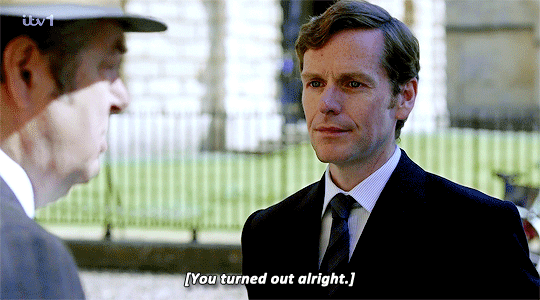



ENDEAVOUR
Series 9, Episode 3.
#endeavour morse#roger allam#shaun evans#exeunt#endeavour itv#endeavouredit#i can’t handle this#take a microplane grater to my soul already #emotional overload#epic acting#i’ll never recover#one of the most brutal scenes i’ve ever seen#Just Morse#how many times am I going to cry when I watch this scene?#how can it be over?#I took a stiletto in the back to get you your life savings#You broke my heart and I gave you the money anyway
286 notes
·
View notes
Text
It’s the Sunday Free-For-All!
I thought for a change, I would try to choose my favorite supporting character. Some episodes are more character/mystery driven, and others are more relationship-driven. Those would be my favorites, but it’s especially enjoyable when supporting characters are written and cast with such care.
I’m having a hard time picking only one. “Sway” is a contender. All of those Burridges staff are fabulous, as is the guy who plays Joey Lisk. The piano tuner is fabulous. It’s really an embarrassment of riches.

The only reason I’m not choosing it is I think “Fugue“ sinks or swims based on the guy who plays Cronyn/Gull; plus the brother and sister are truly well realized. She’s not the most exciting character in the world, but her performance is lovely, and it’s a terrific counterpoint to the sort of creepy/tormented genius that her brother brings to the table. I think he was probably more of a red herring that got edited down, but between the three of them, it’s a winner for me.

On the other hand, how fantastic is it to not just have Danny Webb back as Lott, but have him back in such a disgustingly vile way in “Exeunt”? Now, the guy is really a movie star. He’s been in everything, for God’s sake…his charisma leaps through the screen. He’s more of a guest star than a supporting actor, but every moment he’s on screen is a joy.
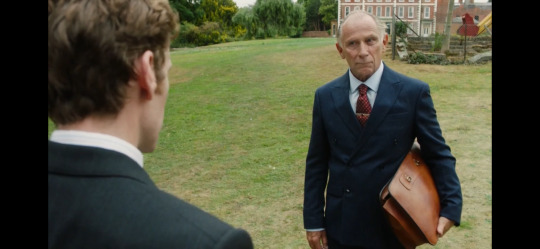
Or is it David Oakes as Joss Bixby? If fanfiction is any thing to gauge reaction by, this is clearly the winner.
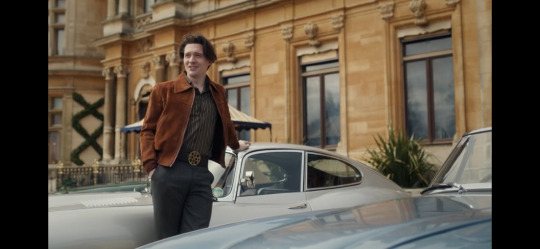
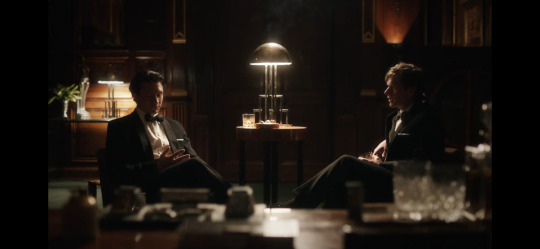
Who do you pick? I can’t choose. I could’ve kept going, frankly. 
#sunday free for all#supporting actor Sunday#David Oakes#Danny Webb#mason gull#Arthur Lott#endeavour morse#itv endeavour#endeavour itv#joss bixby#Endeavour: sway#endeavour: ride#Endeavour: fugue#endeavour: exeunt#Geoffrey Streatfeild#burridges#epic acting#our beautiful onion#our beautiful show
33 notes
·
View notes
Text
ldksja oh boy this'll get long- thanks for the tag adam!
B - Bloodbath for Birds by Squalloscope
L - Like Real People Do by Hozier
A - Anything, Anything, Anything by Madds Buckley
N - Nada Es Gratis En La Vida by El Cuarteto De Nos
K - King by Florence + The Machine
Q - Quiet Americans
U - Until I End Up Dead by Dream
E - El Hijo de Hernández by El Cuarteto De Nos
E - Exeunt by The Oh Hellos
R - Ruin by The Amazing Devils
T- Thus Always To Tyrants by The Oh Hellos
H - Hawk In The Night by Madds Buckley
O - Open Arms from Epic: The Musical
U - Untitled God Song by Hayley Hendrickx
G - Ghost Stories by The Narcissistic Cookbook
H - Hypersomnia by Frankie!!
T - Twisted Threads by The Mechanisms
oh god that's so many letters. anguish. i don't even know who to tag so if you see this and you want to do it go for it
Rules: pick a song for each letter of your URL and tag that many people.
Tagged by @sailforvalinor, and thank you this looks like fun!
Remember and Proclaim (Andrew Peterson)
All I Ask of You (Jackie Evancho)
Innocence (Nathan Wagner)
Níl Sé'n Lá (Celtic Woman)
I Still Need a Savior (Billy Sprague)
No Strings (Ed Sheeran)
Take Me Back Road (Tim & the Glory Boys)
How Great is Our God (Chris Tomlin)
Everything Sad is Coming Untrue (Jason Grey)
El-Shaddai (Amy Grant)
Voice of Truth (Casting Crowns)
Endlessly (Amaranthe)
Not Alone (Red)
I'm an Open Road (Paul Brandt)
Never Leave Your Side (Sam Tinnesz)
Good to Be Alive (Skillet)
Hoo boy, can I think of sixteen people?
@griseldabanks @kraytwriter @kingofattolia @catkin-morgs @clawedandcute @nerdychristianfanboy @steampunk-archer @sergeanttomycaptain @smhalltheurlsaretaken @scribblermerlin @authortobenamedlater @stainedleather @mrtobenamedlater @mrgartist @get-loved-nerd @a-fount-of-blessings (Ignore if this is a repeat tag. Unless you want to do it again. Up to you. :)
4K notes
·
View notes
Text
::::sobs::::


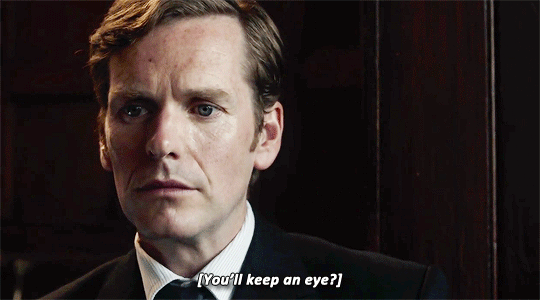
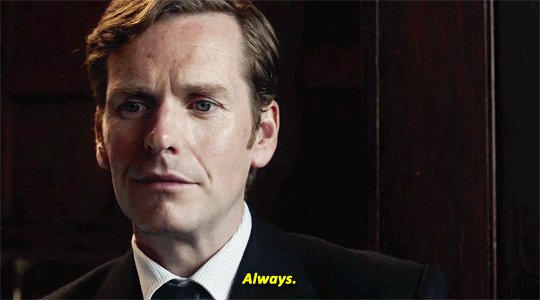
With this lot, it's an eye for an eye no matter how long it takes. Now they've never seen you, but they know Sam. If he were to come back, if they should ever see him again, even you couldn't defend him against that mob. He has to disappear. Yeah, and that's on me. We'll move away somewhere, much further than Carshall..
#endeavour#itv endeavour#endeavour itv#endeavour morse#shaun evans#fred thursday#roger allam#morse x thursday#endeavour gif#the end of the beginning#heartbreaking 💔#breaks my heart#I know thee not old man#The captain I would have followed into hell#feet of clay#epic acting#emotional overload#devastating#i’ll never recover#endeavour s9#s9 Exeunt
164 notes
·
View notes